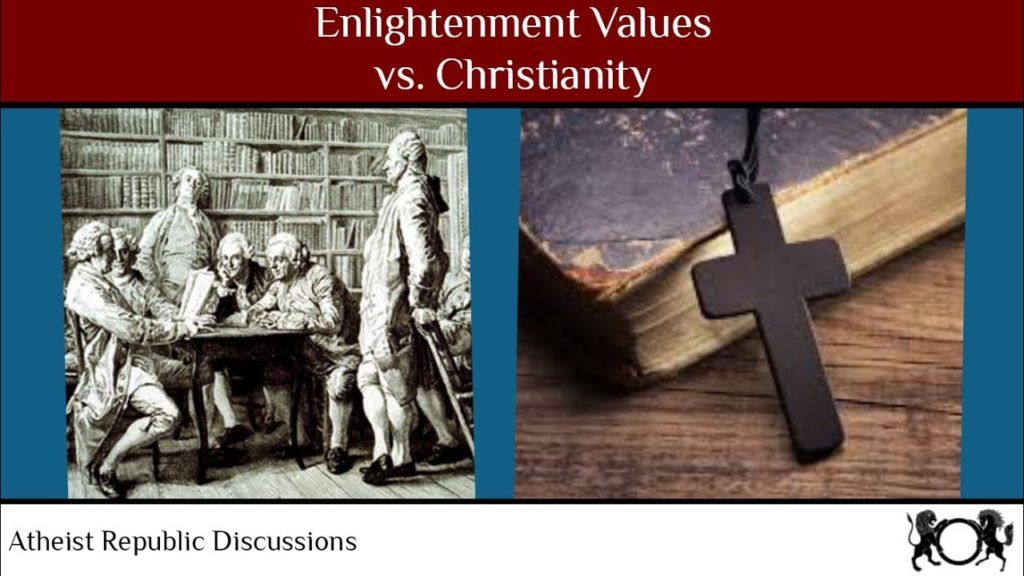
Christianity, I mean the real thing; not the stuff of civic society, is not the enlightenment with a bit of religious ritual for frosting. This is, of course, exactly what liberal and progressive churches have turned Christianity into. Christianity is radically different from the enlightenment, and I wish to delineate some of those differences.
There are many matrixes and prisms through which we can highlight how being a student of the Lord Jesus Christ is in no way the same as being a ‘modern‘; whether that modern is a progressive, a conservative, a communist, or a nazi. To be sure, all these modern ways of being human are different, but they run along the same narrative lines as one another. To the Christian who knows the difference between his/her Christianity and the moderns; all of them are various shades of the same colour, so to speak. Whilst my prism is not the only one possible, I think you will find it a good compass to navigate the differences between us. So let us delineate the difference between we Christians and the moderns of the enlightenment.
The moderns have taken a move to the self over and above the sovereignty of GOD. The Christian holds and believes that time and space, and all that exists, belong to GOD. This includes our very selves, our bodies, our emotional energy, our resources, all of which are the possession of our Maker. The modern believes that he/she owns themselves, that time and space belong to no one, that we make of them what we will, and that includes our own bodies, resources, and emotional energy. This ‘self-will’ is expressed nationally through the state and its apparatus of government which answers to the electorate, as is so defined. To the Christian disciple, both the individual and the body (of the Church) that he belongs, as well as the government of Christian society, all answer to higher claims than they themselves can make. They can be held to a narrative that is above the self and the parliaments. The will of the self must be ‘checked’ against the narrative of the Christian faith; of the kingdom of GOD on earth expressing itself in the living organism, that is the body of Christ.
The enlightenment has prized as a jewel the Christian formation of the ‘individual’; the creation of Christian culture with an emphasis on the ‘conscience’ and the practice of self-examination and confession. This has cultivated our sense of self within the west and has become one of the underpinnings of our western society. The individual identity previously expressed itself through the machinations of the state. It gave of its self to the state; individuals worked and died for the state in their millions. Latterly, in our time, post the traumas of WW1 and WW2, this sense of the ‘individual’ is expressed culturally through its own assertions of identity, politics and commerce, defining its self according to its whims. The Christian disciple of Jesus, however, offers themselves to service of the Church, the body of Christ, through which and in which their identity is fashioned. Whilst there is a sense of being a distinct part of the body of Christ, the Christian who takes this truth seriously would not seek an individual identity, but sees themselves as being part of a ‘people group’ called simply the Church. This body of people holds a unique history, values, and beliefs to which the ‘part’ submits to, upholds, and distinctively works out in their own lives along with the whole to the benefit of the whole!
The epoch before our own expanded its knowledge primarily through philosophy, particularly the idea of reasoning from revelation; accepting that reason could tell us some things, but that revelation would at some point have to take over the journey. To the modern, all that can be known is the material world, all that needs to be known is the material world, and the whole of it can be subject to reason, experimentation, observation, and cataloguing. To many moderns ‘science’ holds the answer and any question that is not a scientific question does not have the same weight as those that can be answered scientifically. The culture born of this way of thinking about the world is one that is enthralled by novelty and curiosity. Their ‘can we’ nearly always becomes ‘we should’.
To the follower of Christ, reason has its place, as well as the scientific method, but these things are pointed directly at GOD. We explore the natural world to discover the language of GOD (mathematics) and we seek to think GOD’s thoughts after Him; to be inspired by His glory, to seek to emulate Him. We seek to use the scientific method, not for its novelty or just because we can, but rather, for the betterment of the condition of man as understood by our faith – as to what is the common good. This gives, as it were, a sharp critique of the moderns and their abuse of science for war, frivolity, and waste. Christians approach the advancements of technology with humility; aware of our sinful natures and our ability to corrupt every good idea. Nothing will bring this reality into greater relief than the new and ongoing genetic revolution which is set to call into question, ‘What is it to be human, anyway?’ Reason works with revelation to guide man, man reasons from and to revelation as his safe harbour, not simply creating a series of unsubstantiated premises.
The moderns prize ‘freedom of choice’ (a highly suspect and questionable premise at best) as if this is the highest possible value – freedom! They perceive it as the act of choosing x,y,z, even if these choices all look remarkably the same. It is their multiplicity and the ability to act without obvious coercion. Sadly, when you factor in the way that government bodies, businesses, and other individuals ‘coerce’ folks, what is truly a free choice is very limited, if we accept that it exists at all. However, to the disciple of Jesus, freedom is understood in a very different way. Freedom is rather the ‘knowledge of the truth.’ It is by knowing that we are free, not by choosing if we choose at all. It is only based on what we think we know. Therefore, real freedom comes from knowing the truth about ourselves, our world, and the purpose of our lives. When we know the answer to the question, “What should I do with my life?” ; “With whom should I start a family (if at all)?”; “What is the true value of things (far less than we imagine – most of the time)?” … Then, and only then, are we truly ‘free’ to make ‘valuable choices’; choices that are virtuous and meritorious, as opposed to decadent and demoralising.
The point of the modern is to live fully in this world; to explore its possibilities, to be (in our consumerist culture) a connoisseur of experience, ‘variety is the spice of life, and self-development of ones own ambitions are paramount. This is understood as wealth, health, and success. To all this, the disciple of Christ says, “This world and all its follies are but a passing shadow; man is but grass and all the glory of man is but the flower of grass; the grass withers and the flower fades away. To the Christian, this life is but a short opportunity to prepare ourselves for the next life where real living begins. Thus for us, we value more than experiences and entertainment. Rather, we value the opportunity to do real good to our neighbours, our families, our friends and, therefore by necessity, ourselves. We seek to cultivate those spiritual resources that will be weighed and sifted upon the great day of the Lord, at which time He will judge the living and the dead.
So what do all these differences mean? It means that Christians, in essence, seek their own death; a death of self, of passions, of will that is directed to themselves. They instead seek a crucifixion of these things; to shed them off like these mortal coils we hope to shed. We seek instead, through the waters of death in Baptism, a new birth in which our will synergises as one and along with our passions are directed to and by the truth of Christ Himself. The self gives way to the mystical reality of Christ’s presence in us and amongst us. Inspired by the hope of the resurrection and strengthened by its reality, we dare to challenge unjust governments, contend with godless ideologies, and seek liberty for the persecuted Church; to build her up as a noble movement through which GOD’s love, hope, joy and peace can be expressed to all. We do not abandon this world, to disappear into some ‘otherworldly life,’ but throw ourselves into its pains and difficulties, into the fight for Christian justice.
We also seek personal holiness and true sanctification of our bodies unto GOD. Wrestling with the deep desires of the flesh that express themselves in greed, lust, envy, wrath, vanity, gluttony, and worst of all, a lack of care for ones own soul. Sloth! We seek, instead, to cultivate and build our life with the beauty of humility, gentleness, kindness, self-control, hope, faith, love, prudence, justice, chastity, generosity, faithfulness, and courage! We do this because we understand the truth, that those in Christ are priests, prophets, and royalty. We are a holy nation unto GOD in this world, but not of this world, offering our lives and bodies as a living sacrifice to the LORD our GOD.

